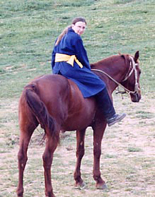 A new website, devoted to Tuva, has been recently created. TyvaWiki is a documentation project intended to collect and disseminate information about Tuva in English. As one of its organizers Stacey Borsody reported to Tuva-Online, the site is designed to promote the use and education of the Tuvan language on the Internet. She also drew a quatation by Alan Cox, famous Linux kernel programmer, if a language is not on computers in fifty years it will no longer exist. We asked Stacey some other questions. Here are the answers A new website, devoted to Tuva, has been recently created. TyvaWiki is a documentation project intended to collect and disseminate information about Tuva in English. As one of its organizers Stacey Borsody reported to Tuva-Online, the site is designed to promote the use and education of the Tuvan language on the Internet. She also drew a quatation by Alan Cox, famous Linux kernel programmer, if a language is not on computers in fifty years it will no longer exist. We asked Stacey some other questions. Here are the answersHow is TyvaWiki deciphered? When was the site created? Whom by? I created TyvaWiki in autumn of 2005. The word "wiki" comes from Hawaiian, where it means fast or swift. A wiki is a website operated by software that lets webpages be quickly edited by anyone. An example of a very large wiki is Wikipedia, which is a free multilingual encyclopedia. TyvaWiki means a wiki about Tyva. Why did you start this project? I started TyvaWiki because I needed a website where I could organize my notes about Tyvan language, culture, and music. I thought it would be important to share what I had because I know it can be difficult to find this information. It grew out of some work that started at a Yahoo.com forum devoted to learning the Tyvan language. Could you tell us about yourself? Who are you by profession? I work as a UNIX system alexistrator for a large email service provider in San Francisco. My background is in art. What do you do in life? I like to throatsing and perform archery from horseback. How much is your personal Tuvan vocabulary? I would say it is very small. I always need to use a dictionary, which is not practical. How and when did you take to Tuvan? What attracts you in this language? I became interested in Tyva and throatsinging in the winter of 1999 while researching the history of my Hungarian ancestors. Then I became interested in the language. The sound of Tyvan throatsinging and music is intimately connected with the rhythm and intonation of the language. Throatsinging can be used in other ways, but without the language and the spirit behind the language it doesn't sound completely Tyvan. How large can the group of the Tuvan Language fans in America be? The number of language fans must be at least equal to the number of music fans. I often hear or read messages from music fans who want to learn the lyrics. They want to sing along. Sometimes a person wants to learn because they are travelling to Tyva and want to give their respect to the Tyvan people by being able to say a few words in Tyvan. I can say with confidence that there are over 90 people worldwide who take an interest in learning the language. This is the number of members on the forum. It is a place to meet and encourage each other to learn. Not everybody is a linguist or knows how to learn a language, or have the same books so we try to help each other. What do you know of the Tuvan language outside Tuva - any language courses? Tuvan teachers? Sadly, there exist more resources for learning fake languages like Klingon from Star Trek than there are for learning a real language like Tyvan. The linguist K. David Harrison has taught a university course on Tyvan in the past and currently Sami Jansson is teaching a course in Finland. Most people end up trying to learn alone because everyone is far away from each other. Who were their Tuvan Tuvan teachers? I know some people who would enjoy very much to have a Tyvan Tyvan teacher. Do you know of any? Who are the main authorities in the Tuvan language propaganda outside Tuva? I think it would have to be Sami Jansson, whom I've already mentioned. How often can you (and your colleagues in the tyvawiki) meet a native Tuvan speaker to check your Tuvan? The only chance to practice that most of us get are when a Tyvan band goes on tour. Almost every year Chirgilchin comes to the US. This year they will teach at a camp in California which will give US people a great opportunity to be exposed to both throatsinging and the Tyvan language. Who were the first to notice the appearance of your site? Who maintains the site and are there any contributors to it? Or is it a purely enthusiastic project? A Dutch Turkologist named Marti has become a major contributor to the site. I'm sorry I don't know her full name. Her participation has helped me to remain focused on the project. Oyun Alexei helped with translating the main page and Todoriki Masahiko has also participated. I am translating the interface but it is difficult to find native words for computer terms. We are always looking for more people to help. Any plans to indulge into the real Tuvan bath? Come to Tuva? I would love very much to go to Tyva some day and ride a horse across the open steppe. I have a little baby at home who needs me here first. Any wishes to Tuvans? Tyva dylda ögbelerining mergen ugaany bar. Tyvalaaryn kagbas. Bügüge chaa chylda aas-kezhikti küzedim!
|
